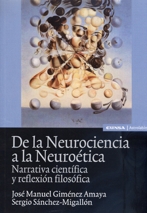You may be interested in:
From Neuroscience to Neuroethics. Scientific narrative and philosophical reflection.
Author: José Ignacio Murillo
Published in: Aceprensa
date of on-line publication: 8 September 2010
review by José Manuel Giménez Amaya and Sergio Sánchez-Migallón. From Neuroscience to Neuroethics. Scientific narrative and philosophical reflection. Eunsa. Pamplona (2010). 183 pp.
Published by José Ignacio Murillo in Aceprensa, 8 September 2010.

In recent years, neuroscience has become a regular feature on topic in the media at speech. This is partly logical, since mental and neurodegenerative diseases are one of the most important challenges in medicine today. But the information we receive is not limited to reporting on their research and achievements, but often presents the new steps and advances as part of a real revolution in man's knowledge and as a definite means to improve it. In other words, and taking its cue from the comments of some of its cultivators and disseminators, Neuroscience seems to be the new and final version of what the ancients called wisdom: the knowledge of oneself and the achievement of happiness.
It is true that progress in the knowledge of the nervous system represents one of the great advances in science today. But an examination of the efforts that have made this possible leads us away from the simplistic vision of neo-Enlightenment scientism, which aims to overcome Philosophy by means of experimental science. Moreover, one of the most evident signs of the maturity of this scientific project is precisely the birth of Neuroethics.
The book by Giménez Amaya and Sánchez-Migallón has the merit of introducing us in a clear and profound way to the heart of the problem and highlighting its transcendence. The subtitle, which some may find disconcerting, is significant: scientific narrative and philosophical reflection. Few things have contributed more to the separation of the sciences from Philosophy and from Humanities in general than the scarce presence of the history of science in the Education and in the internship science. A good review of the avatars that have shaped each discipline is often enough to recognise the philosophical assumptions on which it rests and to raise ambitious questions. On this occasion, it is a medical researcher with a long career and a philosopher of proven solvency who stop to reflect on the pathway that leads a purely scientific business - marked, of course, from the beginning by a clear interdisciplinary character - to an authentic dialogue and partnership with Philosophy.
The authors show how the term Neuroethics is coined to name the effort to solve two different types of problems arising from research about the brain, but which have in common the reference letter to what is traditionally called ethics. On the one hand, the ethics of research and of the use of its results. Possibilities such as the enhancement of normal brain function through drugs and other interventions and their personal and social repercussions, the legitimacy of using brain scans in the fight against terrorism and the application of neuroscience for war purposes, to cite a few examples, bring us face to face with new ethical dilemmas that call for reflection on the goods at stake and on the correct meaning of the term "enhancement" as applied to the human condition. On the other hand, the biological instructions of what we call ethical behaviour is part of the object of neuroscience. Can ethics be reduced to them? Is there anything that distinguishes human behaviour from that of other animals?
The book presents a journey through these problems not so much to solve them as to examine the way in which they have been tackled, always against the background of the question of the possibilities and limits of science in our current status . The information offered and the depth of the reflections that accompany it make it a useful work for anyone who wishes to situate themselves in the social and cultural repercussions of neuroscience.
